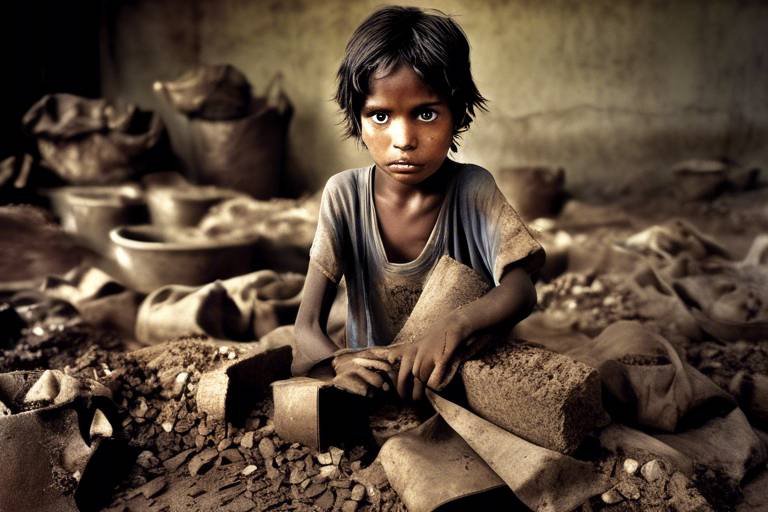The Role of Morality in Environmental Issues
In today's rapidly changing world, the intersection of morality and environmental issues has become increasingly significant. As we face daunting challenges like climate change, deforestation, and pollution, it's crucial to explore how our moral values shape our understanding and response to these pressing concerns. Are we merely stewards of the Earth, or do we bear a deeper ethical responsibility toward the environment and future generations? This article delves into the profound ways in which moral considerations influence our environmental policies, behaviors, and the ethical implications of our interactions with nature.
Environmental ethics is a fascinating field that examines the moral relationship between humans and the environment. It highlights the necessity for ethical frameworks that guide our actions toward nature and its preservation. As we navigate complex ecological dilemmas, we must ask ourselves: what are our obligations to the planet? How do we balance our needs with the health of the ecosystems we inhabit? These questions are not just academic; they are fundamental to our survival and the well-being of future generations.
Every action we take has a ripple effect on the environment, raising critical moral questions about our responsibility and the sustainability of our choices. For instance, when we consider the impact of industrial pollution, we must confront the ethical implications of prioritizing short-term economic gains over long-term ecological health. It's a classic case of weighing our immediate desires against the well-being of the planet. Are we willing to sacrifice the health of our ecosystems for convenience? This dilemma forces us to reflect on the consequences of our actions and the legacy we leave behind.
Consequentialism is a moral philosophy that evaluates the outcomes of actions, prompting us to consider how the environmental impact of our decisions can guide our ethical responsibilities. When we make choices—be it in our personal lives or as policymakers—we must ask ourselves: what are the potential consequences of these actions? For example, if we choose to support renewable energy initiatives, the positive outcomes could include reduced carbon emissions and a healthier planet. Conversely, if we continue to rely on fossil fuels, the consequences could be catastrophic for both the environment and humanity.
Utilitarianism, which emphasizes maximizing overall happiness, often leads to heated debates about prioritizing human welfare versus ecological health. Should we focus on improving the quality of life for current populations at the expense of the environment, or should we aim for a balanced approach that considers the needs of all living beings? This dilemma is particularly evident in environmental policymaking, where resource allocation often reflects a utilitarian calculus that can overlook the intrinsic value of nature. It's essential to find a middle ground where both human and ecological needs are respected and nurtured.
On the other hand, deontological ethics centers on the inherent rightness or wrongness of actions, advocating for duties and obligations toward the environment that transcend mere consequences. This perspective challenges us to consider our moral duties to protect the planet, regardless of the potential outcomes. For instance, we might feel a moral obligation to preserve endangered species, not solely because it benefits humanity, but because it is the right thing to do. This approach invites us to reflect on our values and the ethical principles that guide our interactions with the natural world.
Community involvement in environmental stewardship underscores our collective moral obligation to protect local ecosystems. When individuals come together to advocate for their environment, they foster a sense of shared responsibility and ethical engagement. Think of it like a neighborhood watch for nature—when we band together, we can make a significant impact. Engaging in community clean-up events, supporting local conservation efforts, and advocating for sustainable practices are all ways we can contribute to the health of our environment. This communal approach not only strengthens our bonds but also enhances our moral commitment to the Earth.
The moral implications of climate change challenge societies to confront inequities, intergenerational justice, and the ethical dimensions of climate action. As we witness the devastating effects of climate change, from rising sea levels to extreme weather events, we must grapple with our ethical responsibilities. Are we doing enough to combat these challenges? Are we considering the needs of those most affected—especially marginalized communities who often bear the brunt of environmental degradation?
Intergenerational justice emphasizes our responsibility to preserve the environment for future generations. It raises ethical questions about resource use, conservation, and long-term sustainability. Essentially, we must ask ourselves: what kind of world do we want to leave behind? The choices we make today will undoubtedly shape the future for our children and grandchildren. By prioritizing sustainable practices and policies, we can ensure that future generations inherit a planet that is not only livable but thriving.
Finally, global responsibility in addressing climate change involves recognizing the interconnectedness of nations and our moral obligation to support vulnerable populations disproportionately affected by environmental degradation. Climate change knows no borders, and its impacts are felt worldwide. As we navigate this global crisis, we must remember that our actions have far-reaching consequences. Supporting international climate agreements and providing aid to those in need are essential steps in fulfilling our moral duties as global citizens.
- What is environmental ethics? Environmental ethics is the study of the moral relationship between humans and the environment, focusing on our obligations to nature.
- How do human actions impact the environment? Human activities can lead to pollution, climate change, and habitat destruction, raising moral questions about our responsibilities.
- What is intergenerational justice? Intergenerational justice refers to the ethical obligation to preserve the environment for future generations.
- Why is community involvement important for environmental stewardship? Community involvement fosters a sense of shared responsibility and enhances collective efforts to protect local ecosystems.
- What role do global responsibilities play in climate change? Global responsibilities involve recognizing the interconnectedness of nations and the moral obligation to support those disproportionately affected by environmental issues.

Understanding Environmental Ethics
Environmental ethics is a fascinating field that dives deep into the moral relationship between humans and the natural world. At its core, it challenges us to consider how our actions affect the environment and, in turn, how the environment impacts our lives. This relationship is not just about conservation; it’s about recognizing our responsibilities toward the ecosystems that sustain us. Imagine for a moment that the earth is a vast, interconnected web, where every action we take sends ripples through this web. How can we ensure that our actions strengthen rather than damage it?
One of the primary goals of environmental ethics is to establish ethical frameworks that guide our interactions with nature. These frameworks help us navigate complex decisions, such as whether to prioritize economic growth over ecological preservation. In a world where industrialization often trumps environmental concerns, having a moral compass becomes essential. Environmental ethics encourages us to ask questions like: What is our duty to future generations? How do we balance human needs with the health of our planet? By engaging with these questions, we begin to understand the profound implications of our choices.
Moreover, environmental ethics highlights the importance of recognizing the intrinsic value of nature. It invites us to see the environment not merely as a resource to exploit but as a living entity deserving of respect and protection. This perspective can be transformative, prompting a shift from a human-centered view of the world to one that embraces a more holistic approach. For instance, consider the plight of endangered species. The ethical question arises: do we have a moral obligation to protect them, even if it means sacrificing some of our own conveniences? This is where the heart of environmental ethics lies, urging us to consider the broader consequences of our actions.
In addition, environmental ethics often intersects with other fields such as economics, politics, and social justice. It sheds light on how environmental degradation disproportionately affects marginalized communities, raising critical questions about equity and justice. For instance, when discussing pollution, we must consider who bears the brunt of its effects. Is it fair that low-income neighborhoods often find themselves situated near toxic waste sites? By examining these issues through an ethical lens, we can advocate for more just and equitable environmental policies.
Ultimately, understanding environmental ethics is about fostering a sense of stewardship and responsibility. It challenges us to rethink our relationship with nature, urging us to act not just in our own interests but in the interests of the planet and its diverse inhabitants. As we navigate the complexities of modern life, let’s remember that every choice we make—whether it’s the products we buy, the energy we consume, or the policies we support—has ethical implications. By embracing environmental ethics, we can contribute to a more sustainable and just world for ourselves and generations to come.

The Impact of Human Actions
Human actions have an enormous impact on the environment, shaping the world we live in and determining the fate of countless species. From the moment we wake up and flick on the lights to the time we go to bed, our choices—big and small—echo through ecosystems, influencing everything from air quality to biodiversity. Have you ever stopped to think about how your daily habits affect the planet? Each time we choose convenience over sustainability, we contribute to a cycle that can lead to environmental degradation.
Consider the simple act of driving a car. While it might seem harmless, the emissions produced contribute significantly to air pollution and climate change. According to the Environmental Protection Agency (EPA), transportation is one of the largest sources of greenhouse gas emissions in the United States. This leads us to moral questions about our responsibility: Are we prioritizing our comfort and convenience over the health of our planet and future generations? It’s a tough pill to swallow, but our actions today will shape the world of tomorrow.
Moreover, the consequences of our actions are not always immediate. For instance, deforestation for agriculture or urban development might seem necessary for economic growth. However, the long-term effects—like loss of biodiversity, soil erosion, and disruption of water cycles—can be catastrophic. When we cut down trees, we are not just removing a resource; we are dismantling a complex web of life that has taken centuries to develop. This leads to a crucial question: Do we have the right to exploit natural resources without considering the long-term ramifications?
In addition, the moral implications of pollution cannot be ignored. The air we breathe and the water we drink are increasingly contaminated by industrial waste and plastic. This raises ethical concerns about our duty to protect not only our health but also the health of the planet. The World Health Organization (WHO) reports that millions of people die each year due to air pollution-related diseases. If our actions contribute to such suffering, what does that say about our values? Are we willing to turn a blind eye to the suffering of others—both human and non-human—just to maintain our current lifestyle?
As we navigate these complex issues, it's essential to recognize that our moral frameworks must evolve alongside our understanding of environmental science. We need to foster a culture that prioritizes sustainability and ethical responsibility. This includes advocating for policies that promote renewable energy, sustainable agriculture, and conservation efforts. By doing so, we can ensure that our actions align with our values, creating a more just and equitable world for all living beings.
In summary, the impact of human actions on the environment is profound and multifaceted. It challenges us to rethink our choices and encourages a deeper understanding of our moral responsibilities. As we face pressing environmental issues, it's crucial to engage in conversations about how our individual and collective actions can lead to a healthier planet. After all, the world we leave behind is a reflection of the choices we make today.
- What are the main human activities that impact the environment?
Human activities such as deforestation, pollution, industrialization, and overconsumption of resources significantly affect the environment. These activities lead to climate change, loss of biodiversity, and degradation of ecosystems.
- How can individuals reduce their environmental impact?
Individuals can reduce their environmental impact by adopting sustainable practices such as using public transportation, reducing waste, conserving energy, and supporting eco-friendly products.
- Why is it important to consider future generations in environmental decisions?
Considering future generations is crucial because the choices we make today will determine the health and viability of the planet for those who come after us. It is our moral obligation to ensure a livable world for future inhabitants.

Consequentialism and Environmental Decisions
When we talk about consequentialism, we're diving deep into the waters of ethics, where the outcomes of our actions take center stage. Imagine you're at a crossroads, and every direction you take has a ripple effect on the environment. This ethical framework encourages us to weigh those outcomes carefully, prompting us to consider not just what we do, but how our choices impact the world around us. In the context of environmental decisions, this means evaluating the potential benefits and harms of our actions, and ultimately, making choices that lead to the greatest good for the greatest number.
For instance, consider a community debating whether to build a new factory. On one hand, the factory promises job creation and economic growth, which could uplift many families. However, on the other hand, it could lead to pollution, habitat destruction, and long-term health risks for residents. This is where consequentialism shines—it pushes us to ask, "What are the long-term effects of this decision?" By analyzing the potential outcomes, we can navigate the murky waters of morality and make informed choices that balance economic benefits with environmental preservation.
Moreover, this ethical approach encourages transparency and accountability in environmental policymaking. When policymakers adopt a consequentialist perspective, they must consider the broader implications of their decisions, from the immediate effects on local ecosystems to the long-term impacts on global climate change. This can lead to more comprehensive strategies that incorporate sustainability as a core principle. For example, if a government is deciding on a new energy policy, a consequentialist view would compel them to evaluate not just the economic costs, but also the environmental costs and benefits, leading to a more holistic approach to energy production.
However, consequentialism isn't without its challenges. Critics argue that focusing solely on outcomes can lead to justifying harmful actions if they produce a perceived greater good. For instance, if a corporation decides to cut costs by reducing environmental regulations, they might argue that the economic benefits outweigh the environmental damage. This raises the question: are we sacrificing the health of our planet for short-term gains? It’s a slippery slope that requires careful consideration and ethical scrutiny.
In the end, the role of consequentialism in environmental decisions is about striking a balance. It's about recognizing that our choices today will echo into the future, affecting not only our lives but also the lives of generations to come. By embracing this ethical framework, we can foster a deeper understanding of our responsibilities to the planet and inspire actions that prioritize the well-being of both humanity and the environment.
- What is consequentialism? Consequentialism is an ethical theory that judges the rightness or wrongness of actions based on their outcomes or consequences.
- How does consequentialism apply to environmental decisions? It encourages decision-makers to consider the long-term effects of their actions on the environment and society, promoting choices that lead to the greatest overall benefit.
- What are some criticisms of consequentialism? Critics argue that it can justify harmful actions if they result in a perceived greater good, potentially leading to unethical decisions.
- Can consequentialism coexist with other ethical frameworks? Yes, many argue that a balanced approach that incorporates aspects of different ethical theories can lead to more comprehensive and responsible decision-making.

Utilitarian Perspectives
Utilitarianism, at its core, is about maximizing overall happiness and minimizing suffering. When we apply this principle to environmental issues, we find ourselves at a crossroads of ethical decision-making that weighs human welfare against ecological health. Imagine a world where every decision we make is like a scale, balancing the well-being of people with the health of our planet. It's a delicate dance, and the stakes are incredibly high.
One of the fascinating aspects of utilitarian perspectives is how they push us to consider the broader consequences of our actions. For instance, when debating policies on fossil fuel usage, a utilitarian approach would analyze the long-term impacts on both current populations and future generations. Would the short-term economic benefits outweigh the potential environmental degradation and health issues that could arise? This kind of questioning is essential in shaping responsible policies that reflect our moral obligations.
However, utilitarianism isn't without its challenges. It often leads to heated debates about which lives matter more and whose happiness is prioritized. For example, when allocating resources for environmental protection, should we focus on areas that benefit the majority, even if it means neglecting vulnerable ecosystems or communities? This is where the moral complexity of utilitarianism shines through, as it forces us to confront difficult choices and the potential trade-offs involved.
Moreover, utilitarianism can sometimes lead to a paradox where the pursuit of the greatest good for the greatest number might justify harmful actions against minority groups or ecosystems. This raises critical questions about the ethical implications of such decisions. Are we willing to sacrifice the health of a specific community or a unique habitat for the sake of broader societal benefits? These dilemmas illustrate the necessity of integrating other ethical frameworks, such as deontological ethics, to ensure that our pursuit of happiness does not come at the expense of fundamental rights and duties.
In practice, utilitarian perspectives can be applied in various ways, such as:
- Policy Making: Crafting regulations that aim to maximize environmental benefits while minimizing social costs.
- Resource Allocation: Determining where to invest funds for conservation efforts that yield the highest collective benefit.
- Public Awareness Campaigns: Educating communities about sustainable practices that lead to greater happiness for all.
Ultimately, embracing a utilitarian perspective in environmental decision-making encourages us to think critically about the consequences of our actions. It pushes us to consider not just the immediate effects but also the ripple effects that our choices have on the world around us. As we navigate the complexities of environmental ethics, let’s remember that every action counts, and the pursuit of happiness should include both humanity and nature in harmony.
Q: What is utilitarianism?
A: Utilitarianism is an ethical theory that suggests that the best action is the one that maximizes overall happiness or well-being for the greatest number of people.
Q: How does utilitarianism apply to environmental issues?
A: It encourages decision-makers to evaluate the consequences of their actions on both human welfare and ecological health, aiming for policies that benefit the majority while considering long-term impacts.
Q: What are some criticisms of utilitarianism in environmental ethics?
A: Critics argue that it can lead to unjust outcomes by prioritizing the majority's happiness over the rights and well-being of minority groups or ecosystems.
Q: Can utilitarianism coexist with other ethical frameworks?
A: Yes, many advocate for a blended approach that incorporates utilitarianism with deontological ethics to ensure a more comprehensive and just framework for environmental decision-making.

Deontological Approaches
When we dive into the realm of deontological ethics, we're stepping into a world where the morality of actions is judged based on their inherent qualities rather than their outcomes. Think of it as a moral compass that doesn’t sway with the winds of consequence. In this framework, certain actions are deemed right or wrong, regardless of the results they produce. For instance, consider the act of polluting a river. From a deontological standpoint, this action is inherently wrong because it violates our duty to respect and protect the natural world.
This approach to environmental ethics emphasizes the idea that we have moral duties to the planet that transcend our immediate interests. It asks us to reflect on questions like: "Is it our duty to preserve biodiversity?" or "Do we have an obligation to maintain the health of our ecosystems?" These questions lead us to a deeper understanding of our responsibilities as stewards of the Earth. Unlike consequentialist views that might justify harmful actions if they lead to a perceived greater good, deontological ethics insists that we must uphold our commitments to the environment, no matter the temptation to prioritize short-term gains.
Moreover, deontological ethics can guide our environmental policies and personal behaviors in significant ways. For instance, governments and organizations can adopt regulations that reflect these moral duties. By establishing laws that protect endangered species or restrict harmful emissions, we are not just responding to the consequences of pollution or extinction; we are affirming our obligation to act ethically toward all living beings. This creates a framework where the protection of nature is not merely a choice but a moral imperative.
To illustrate, let’s consider a few key principles of deontological approaches in environmental ethics:
- Respect for Nature: This principle emphasizes that nature has intrinsic value and deserves respect, regardless of its utility to humans.
- Duty to Future Generations: We have an obligation to ensure that future generations inherit a planet that is not depleted or damaged by our actions.
- Justice for All Species: All forms of life have a right to exist, and we must consider the welfare of other species in our decision-making processes.
By embracing these principles, we can cultivate a more ethical relationship with the environment. The deontological approach encourages us to think beyond ourselves and consider the broader implications of our actions. It inspires a sense of duty that can lead to more sustainable practices and policies. After all, if we view our interactions with nature through the lens of moral obligation, we are more likely to act in ways that honor and protect our planet.
In conclusion, deontological approaches to environmental ethics challenge us to rethink our responsibilities. They remind us that our actions should align with our moral duties, urging us to protect the environment not just for ourselves but for all living beings and future generations. By committing to these ethical standards, we can foster a more sustainable and just world.
- What is deontological ethics? Deontological ethics is a moral philosophy that judges the morality of actions based on rules and duties rather than consequences.
- How does deontological ethics apply to environmental issues? It emphasizes our moral obligations to protect the environment and act in ways that respect nature, regardless of the outcomes.
- Can deontological ethics influence environmental policy? Yes, by establishing laws that reflect moral duties, deontological ethics can guide policymakers toward more sustainable practices.

Community and Environmental Responsibility
When we talk about , we're diving into a pool of shared values and collective actions that can make a real impact on our planet. Imagine a neighborhood where every single person feels a sense of duty to care for their local environment. It’s not just about individual actions; it’s about creating a culture where environmental stewardship is part of the community's DNA. When communities come together, they can tackle environmental issues more effectively than any single entity could alone. This collective effort can lead to innovative solutions, increased awareness, and a stronger commitment to protecting the natural world.
One of the most exciting aspects of community involvement is the potential for empowerment. When people feel they have a say in the decisions that affect their environment, they are more likely to take action. For instance, community-led initiatives such as local clean-up days, tree planting events, and educational workshops can inspire residents to engage actively with their surroundings. Not only do these activities beautify the area, but they also foster a sense of pride and ownership among community members. By working together, communities can create a ripple effect, encouraging others to take similar steps toward sustainability.
However, it's essential to recognize that community responsibility goes beyond just local actions. It also involves understanding and addressing broader environmental issues that affect us all. For example, when communities advocate for policies that promote renewable energy or sustainable land use, they are not just looking out for their own backyard; they are contributing to a global movement. This interconnectedness highlights the importance of solidarity and shared responsibility in tackling environmental challenges.
Moreover, education plays a crucial role in fostering community responsibility. By raising awareness about environmental issues, communities can equip individuals with the knowledge they need to make informed decisions. Schools, local organizations, and community centers can serve as hubs for environmental education, offering resources and programs that encourage sustainable practices. When people understand the impact of their actions, they are more likely to change their behaviors for the better.
To illustrate the power of community responsibility, consider the following table that outlines some effective community initiatives aimed at promoting environmental stewardship:
| Initiative | Description | Impact |
|---|---|---|
| Community Clean-Up Days | Organized events where residents come together to clean local parks, rivers, and streets. | Improved local environments and increased community pride. |
| Tree Planting Campaigns | Efforts to plant trees in urban areas to enhance green spaces and combat air pollution. | Enhanced biodiversity and improved air quality. |
| Education Workshops | Programs aimed at teaching community members about sustainable practices and environmental issues. | Increased awareness and informed decision-making. |
In conclusion, community and environmental responsibility is a powerful concept that can lead to transformative change. By fostering a sense of shared duty, encouraging education, and promoting collective action, communities can become champions of sustainability. It’s about creating a legacy where future generations inherit a healthier planet because we took the time to care today. So, the next time you think about your role in the community, remember that every small action counts, and together, we can make a significant difference.
- What is community environmental responsibility?
It refers to the collective actions and shared values of a community aimed at protecting and enhancing the local environment.
- How can I get involved in my community's environmental initiatives?
You can participate in local clean-up events, join environmental organizations, or advocate for sustainable policies in your area.
- Why is education important in promoting environmental responsibility?
Education raises awareness about environmental issues, equipping individuals with the knowledge needed to make informed, sustainable choices.
- What are some examples of successful community environmental initiatives?
Examples include community clean-up days, tree planting campaigns, and educational workshops focused on sustainability.

Climate Change and Moral Imperatives
The issue of climate change is not just an environmental crisis; it is a profound moral challenge that confronts humanity today. As we witness the devastating impacts of climate change—rising sea levels, extreme weather events, and biodiversity loss—it becomes increasingly clear that our actions (or inactions) carry significant moral weight. This raises critical questions: What responsibilities do we have to the planet? How do we balance our needs with the health of our ecosystems? These questions are at the heart of the moral imperatives surrounding climate change.
At its core, the moral imperative to address climate change stems from the recognition that our actions today will profoundly shape the world for future generations. This notion is often referred to as intergenerational justice. It emphasizes that we have a duty to preserve the environment and its resources not just for ourselves, but for those who will inherit the Earth after us. Imagine a parent who squanders their savings without considering their children’s future; this is similar to how we are currently treating our planet. The question we must ask ourselves is: Are we leaving a legacy of sustainability or one of depletion?
Moreover, the ethical dimensions of climate change extend beyond just future generations to include the most vulnerable populations today. The impacts of climate change are not felt equally; marginalized communities often bear the brunt of environmental degradation, despite contributing the least to the problem. This disparity highlights a profound moral obligation for those in more privileged positions to act on behalf of those who are suffering. It’s akin to being in a lifeboat; if you see someone struggling in the water, do you not have a moral duty to throw them a rope? In the context of climate change, this means recognizing our global responsibility to support those disproportionately affected by environmental crises.
As we consider these moral imperatives, it’s essential to understand that addressing climate change is not merely about reducing carbon emissions or transitioning to renewable energy. It involves a fundamental shift in how we view our relationship with the Earth and each other. We must foster a sense of collective responsibility that transcends borders and cultures. This can be achieved through community engagement, education, and policy advocacy that prioritize sustainable practices and equitable resource distribution.
To illustrate the urgency of these moral imperatives, consider the following table that outlines the key ethical concerns associated with climate change:
| Ethical Concern | Description |
|---|---|
| Intergenerational Justice | The obligation to preserve resources and a healthy environment for future generations. |
| Global Equity | Addressing the disproportionate impacts of climate change on vulnerable communities. |
| Collective Responsibility | The need for a united approach to environmental stewardship across nations. |
In conclusion, the moral imperatives surrounding climate change compel us to reflect on our values and actions. They challenge us to question whether we are acting as responsible stewards of the Earth or merely as passive participants in its degradation. The path forward requires a commitment to ethical action, a willingness to engage with others, and a recognition that our choices today will resonate far into the future. Let’s not just think about what we can take from the Earth, but rather what we can give back to ensure a thriving planet for generations to come.
- What is intergenerational justice? Intergenerational justice refers to the ethical principle that current generations have responsibilities to future generations, particularly regarding the preservation of the environment and resources.
- How does climate change affect vulnerable populations? Vulnerable populations often face the worst impacts of climate change, such as food and water scarcity, displacement, and health risks, despite contributing the least to greenhouse gas emissions.
- What can individuals do to address climate change? Individuals can reduce their carbon footprint, advocate for sustainable policies, support renewable energy initiatives, and engage in community efforts to promote environmental stewardship.

Intergenerational Justice
Intergenerational justice is a concept that digs deep into our moral obligations to future generations, and let’s face it, it’s a pretty hefty topic. Imagine standing on a bridge, looking back at the past while also peering into the future. What we do today, from the resources we consume to the policies we implement, will shape the world that our children and grandchildren inherit. It's like a game of dominoes; one small action can lead to a cascade of consequences that can either uplift or undermine the quality of life for those who come after us. So, how do we balance our needs with the rights of future inhabitants of this planet?
At the heart of intergenerational justice lies the notion of **sustainability**. It’s not just a buzzword; it’s our guiding principle. We must ask ourselves: Are we being responsible stewards of the Earth? Are we leaving behind a legacy that future generations can be proud of? The answers to these questions require us to reflect on our consumption habits, our waste management practices, and our commitment to preserving biodiversity. If we exploit natural resources today without a thought for tomorrow, we are essentially robbing future generations of their rightful inheritance.
Moreover, intergenerational justice challenges us to think critically about **resource allocation**. For instance, consider the following table that illustrates the potential impacts of our current practices versus sustainable alternatives:
| Current Practices | Sustainable Alternatives | Impact on Future Generations |
|---|---|---|
| Overfishing | Regulated fishing quotas | Preserves marine biodiversity |
| Deforestation | Reforestation initiatives | Maintains ecosystem balance |
| Fossil fuel reliance | Investment in renewable energy | Mitigates climate change effects |
This table illustrates that our choices today can either pave the way for a thriving planet or lead to a barren wasteland. The moral imperative here is clear: we owe it to future generations to make choices that prioritize the health of our planet. But how do we ensure that our voices are heard in the corridors of power? How do we advocate for policies that reflect an understanding of intergenerational justice?
One approach is to engage in **community activism**. By joining forces with others who share similar values, we can create a powerful movement advocating for sustainable policies. Whether it's participating in local clean-up drives, supporting renewable energy projects, or lobbying for stricter environmental regulations, every action counts. The more we raise awareness about intergenerational justice, the more likely it is that decision-makers will take notice and act accordingly.
Additionally, education plays a vital role in fostering a sense of responsibility toward future generations. By teaching younger generations about the importance of environmental stewardship and ethical decision-making, we equip them with the tools they need to continue the fight for a sustainable future. It's about planting the seeds of awareness today so that they can grow into a forest of action tomorrow.
Ultimately, intergenerational justice is not just a philosophical concept; it’s a call to action. It urges us to think beyond our immediate desires and consider the long-term effects of our choices. So, as we navigate the complexities of environmental issues, let’s remember our duty to those who will walk the earth after us. Let’s strive to create a world where they can thrive, not just survive. After all, we are all part of the same story, and how we choose to write our chapter will determine the legacy we leave behind.
- What is intergenerational justice? Intergenerational justice refers to the moral obligation we have to ensure that future generations inherit a healthy and sustainable environment.
- Why is sustainability important? Sustainability is crucial because it helps preserve resources and ecosystems for future generations, ensuring they can enjoy a quality life similar to ours.
- How can I contribute to intergenerational justice? You can contribute by practicing sustainable habits, engaging in community activism, and advocating for policies that prioritize environmental health.

Global Responsibility
When we think about , it’s essential to recognize that we’re all part of a larger tapestry that connects us through our shared planet. The challenge of climate change doesn’t respect borders; it’s a universal issue that requires a collective response. Just like a spider web, where each strand is vital to the integrity of the whole, every nation plays a crucial role in addressing environmental degradation. But what does this really mean for us as individuals and communities?
First, let’s consider the idea of interconnectedness. Countries around the world are not isolated entities; they are part of an intricate system where actions in one region can have ripple effects globally. For instance, when deforestation occurs in the Amazon, it doesn’t just affect local wildlife or indigenous communities; it contributes to global warming, impacting weather patterns and ecosystems thousands of miles away. This reality highlights our moral obligation to act not just in our own interest but in the interest of the global community.
Moreover, the concept of extends to addressing the inequities faced by vulnerable populations. These communities often bear the brunt of environmental issues, despite contributing the least to the problem. For example, low-lying island nations are experiencing the harsh realities of rising sea levels, threatening their very existence. Here, the question arises: how can we, as global citizens, support those disproportionately affected by climate change?
One way to engage with this moral imperative is through international cooperation. Countries must work together to share resources, knowledge, and technology to combat climate change effectively. This could take the form of:
- Financial support: Wealthier nations can provide funding for renewable energy projects in developing countries.
- Technology transfer: Sharing green technologies can empower nations to develop sustainable practices.
- Capacity building: Training and education programs can help vulnerable populations adapt to climate impacts.
Additionally, global responsibility also means holding corporations accountable for their environmental impact. Businesses must recognize their role in contributing to climate change and take proactive steps to reduce their carbon footprint. This might include adopting sustainable practices, reducing waste, and investing in renewable energy. After all, the choices made by corporations can significantly influence environmental policies and practices worldwide.
In essence, embracing global responsibility is about fostering a sense of shared ethics and collective action. It’s about recognizing that our choices—whether as individuals, communities, or nations—have far-reaching consequences. By working together, we can create a more sustainable future that honors our moral obligations to each other and the planet. The question remains: are we willing to step up and take on this responsibility?
- What is global responsibility in the context of environmental issues?
Global responsibility refers to the moral obligation of individuals, communities, and nations to act collectively in addressing environmental challenges that affect the planet and its inhabitants. - How can individuals contribute to global responsibility?
Individuals can contribute by making sustainable choices, advocating for environmental policies, supporting eco-friendly businesses, and raising awareness about climate change. - Why is it important for developed nations to support developing countries in environmental efforts?
Developed nations often have greater resources and capabilities, and their support can help developing countries build resilience against climate impacts and transition to sustainable practices. - What role do corporations play in global responsibility?
Corporations have a significant impact on the environment and must adopt sustainable practices, reduce their carbon footprint, and take accountability for their actions to contribute positively to global responsibility.
Frequently Asked Questions
- What is environmental ethics?
Environmental ethics is a field of study that examines the moral relationship between humans and the environment. It emphasizes the importance of ethical frameworks to guide our actions and decisions regarding nature and its preservation. Essentially, it asks us to consider how our choices impact the planet and the living beings that share it.
- How do human actions affect the environment?
Human activities, such as industrialization, deforestation, and pollution, have a profound impact on the environment. These actions raise moral questions about our responsibilities toward sustainability and the well-being of future generations. It's like throwing a stone into a pond; the ripples of our actions can extend far beyond what we initially see.
- What is the role of consequentialism in environmental decisions?
Consequentialism evaluates the outcomes of our actions, prompting us to consider how the environmental impact of our decisions should inform our moral responsibilities. In other words, it challenges us to think about whether the benefits of our actions outweigh the potential harm to the environment.
- How does utilitarianism influence environmental policymaking?
Utilitarianism focuses on maximizing overall happiness, which can lead to debates about whether to prioritize human welfare over ecological health. Policymakers often face tough choices, akin to balancing on a seesaw, where one side represents immediate human needs and the other stands for long-term environmental sustainability.
- What are deontological approaches to environmental ethics?
Deontological ethics emphasizes the inherent rightness or wrongness of actions, advocating for our duties and obligations toward the environment that go beyond the consequences. This perspective argues that we have a moral obligation to protect nature simply because it is the right thing to do.
- Why is community involvement important in environmental stewardship?
Community involvement fosters a sense of shared responsibility and ethical engagement in protecting local ecosystems. When people come together to care for their environment, it creates a collective moral obligation that can drive positive change, much like a team working toward a common goal.
- What are the moral implications of climate change?
The moral implications of climate change challenge us to confront issues of inequity, intergenerational justice, and the ethical dimensions of climate action. It raises difficult questions about our responsibilities to those most affected by environmental degradation, pushing us to think about fairness and justice on a global scale.
- What is intergenerational justice?
Intergenerational justice emphasizes our responsibility to preserve the environment for future generations. It raises ethical questions about how we use resources today and what legacy we leave behind, urging us to consider the long-term impacts of our actions.
- How does global responsibility relate to climate change?
Global responsibility involves acknowledging the interconnectedness of nations in addressing climate change. It highlights our moral obligation to support vulnerable populations that are disproportionately affected by environmental issues. Just as we wouldn’t ignore a friend in need, we must extend our compassion and action to those facing the brunt of climate impacts worldwide.



















